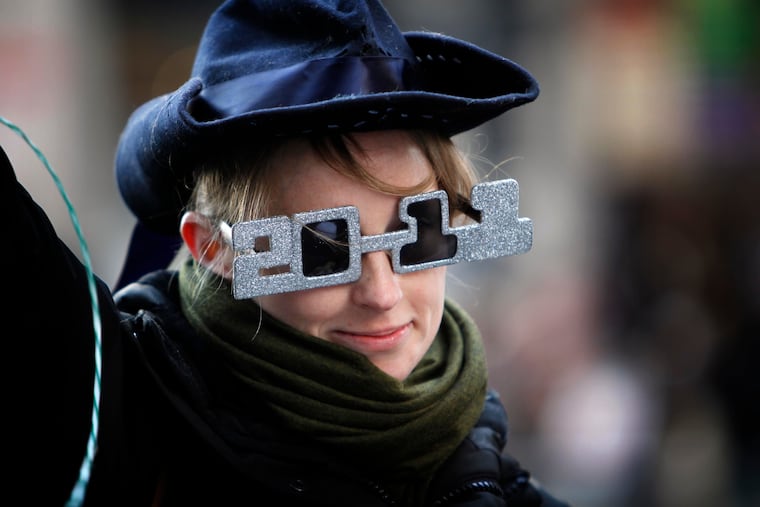Does 2020 mark the start of a new decade? It’s surprisingly debatable.
The decade ends on Dec. 31. Or does it?

Millions of Americans are preparing to welcome the new decade with New Year’s Eve celebrations. It’s a shame they’re 366 days early.
At least that’s the judgment of a variety of authoritative sources, obviously undeterred by the resounding defeats they endured in 2000. In their views, the world marked the beginning of the third millennium before its time, like players spraying champagne before the title game is over.
Legendary Library of Congress researcher Ruth Freitag — whose work was hailed by the likes of Isaac Asimov and Carl Sagan — has argued that using years ending in “9″ to mark a decade’s conclusion goes against the judgment of historians, “others involved in measuring time,” and “simple arithmetic.”
The weather community, for whom time protocols are important, is with her. The U.N. World Meteorological Organization and the National Oceanic and Atmospheric Administration recalibrate their running climate “normals” at the end of the “0″ years, not at the beginning.
That said, those who would care to call it a decade on Dec. 31 have plenty of ammunition, if not reason, on their side.
A Merriam-Webster honcho is on record as saying it’s OK to jump the gun; time, like language, is a human construct. But in an article those referees of the language conclude: “We assume there will be renewed debate on the matter in the late 2000s, and won’t weigh in ourselves in the meanwhile.”
“This is one of those situations where no matter what side you’re on, you’re probably going to get into a bar fight,” Geoff Chester, an official at the U.S. Naval Observatory, said last week.
The disagreements are actually quite old, going back more than three centuries, according to Freitag.
In 1995, as the third millennium loomed — more or less — she assembled an extraordinary collection of references related to this mighty issue in her booklet Battle of the Centuries.
Is this really so hard to figure out?
No, insists Freitag, and the Farmer’s Almanac is on her side.
Since there was no year “0” at the very beginning of the calendar, it follows that the year “1″ would be the first year of the decade, century, or millennium.
The almanac invokes the analogy of a building in which the ground floor would be the lobby, or the equivalent of the zero floor, the first floor would be one flight above. The elevator would have to ascend 10 stories to reach the 10th floor.
“This is just my personal opinion,” said Chester of the Naval Observatory — that national arbiter of chronological correctness is maintaining neutrality — “I count from 1 to 10, not 0 to 9. When I turned 50, I told people that I was in the last year of my 40s.”
So what is the source of the confusion?
Calendars are the products of ingenious but fallible human beings, notes Chester.
The very concept of a year “2000” (leaving aside whether it was the end or beginning of a millennium), is rooted largely in the work of one Dionysius Exiquues, or “Dennis the Short,” in the fifth century, or at least it was the fifth by his calculation.
Dionysius attempted to count the passage of time from the birth of Jesus, thus the term anno Domini, Latin for “year of our Lord, or A.D.”
Questions about the actual date on which Jesus was born aside, Dionysius evidently confused his calculations by decreeing that the year of the nativity was 1 A.D., and the year before, 1 B.C. He did not designate a year 0.
» READ MORE: Weird New Year’s Eve ‘drops’ in Pennsylvania: Sleds, pickles, and britches
What they’ve said about centuries
Ambiguities have done nothing to quell passions.
Here are a few choice words from Freitag’s collection.
Gentleman’s magazine, June 1798:
A letter is quoted in which the writer states that the United Kingdom’s “Astronomer Royal and Dr. [presumably astronomer William] Herschel, the two greatest living authorities, are of opinion that the next century will commence with the year 1800.”
London Times, Dec. 26, 1799:
“We are astonished to find it has been the subject of so much dispute, since it appears to be perfectly plain. The present century will not terminate till January 1, 1801, unless it can be made out that 99 are 100. Eighteen centuries are 1800 years, then how can 18 centuries be completed till the year 1800 has expired?”
Washington Post, Dec. 19, 1899:
“A century can end only with the completion of a hundred years, and nineteen centuries can end only with the completion of nineteen hundred years. The nineteenth century, therefore, ends with the last day of the year 1900, and the twentieth century cannot begin before that time. …
“This is a free country, and almost any citizen can assert, if he wants to, that 99 makes 100. What are we coming to, when our best people can be muzzled by the dry and stupid laws of mathematics?”
London Times, April 2, 1991:
“The world has voted with its cheque book in the debate on precisely when the millennium ends. While pedants continue to pit December 31, 1999, against the end of the year 2000, everyone who is anyone, it seems, has opted for the earlier date as the time to organize what they hope will be the mother of all parties.”
So is it over before it’s over?
If you care to celebrate the dawn of the new decade on Dec. 31, the U.S. Naval Observatory will not stop you.
Said Chester, “Our official position is … Nyeh.”